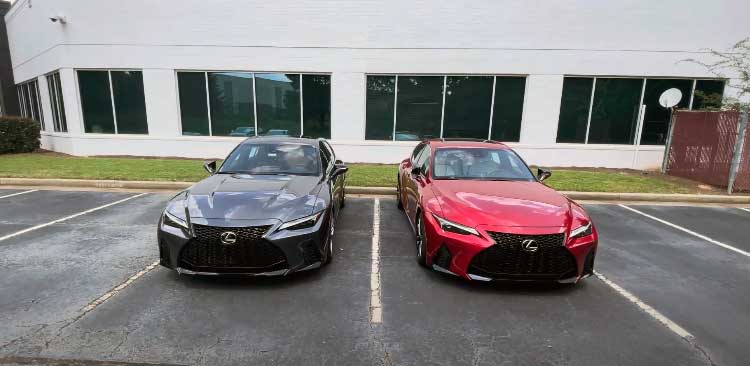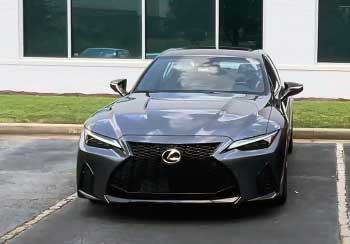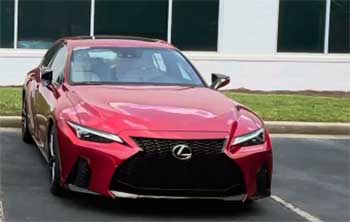As a car enthusiast who’s spent countless hours behind the wheel, I’m thrilled to share my journey comparing the Lexus IS350 and IS500. My goal is to unpack their differences, weighing the pros and cons to help you decide which luxury sedan fits your driving style. From performance to comfort, I’ll break it all down with a first-person perspective, blending real-world insights with detailed analysis. By the end, you’ll have a clear picture of what each model offers and which might be your perfect ride.

Comparison Table of Lexus IS350 vs. Lexus IS500
| Feature | Lexus IS350 | Lexus IS500 |
| Engine | 3.5L V6, 311 hp, 280 lb-ft torque | 5.0L V8, 472 hp, 395 lb-ft torque |
| 0-60 mph | 5.6 seconds (RWD) | 4.3 seconds |
| Drivetrain | RWD or AWD | RWD only |
| Fuel Economy | 20/28 mpg (RWD), 19/26 mpg (AWD) | 17/25 mpg |
| Base Price | $41,260 | $60,545 |
| Transmission | 8-speed automatic (RWD), 6-speed (AWD) | 8-speed automatic |
| Suspension | Adaptive Variable Suspension (F Sport) | Adaptive dampers, Yamaha rear damper |
| Infotainment | 8-inch touchscreen, optional 10.3-inch | 8-inch touchscreen, optional 10.3-inch |
| Audio System | 10-speaker, optional Mark Levinson | 17-speaker Mark Levinson (Premium trim) |
| Interior Space | 44.8 inches front legroom, 32.2 inches rear | Same as IS350 |
| Weight | 3,880 lbs (RWD), 3,968 lbs (AWD) | 3,969 lbs |
| Warranty | 48 months/80,000 km comprehensive | Same as IS350 |
My Journey with Luxury Sport Sedans
I’ve always been drawn to the world of luxury sport sedans, where performance meets refinement. The Lexus IS line, with its blend of sharp handling, plush interiors, and reliable engineering, has long caught my eye. Driving through city streets or carving up winding roads, these cars promise a balance that’s hard to beat.
The IS350 and IS500, in particular, stand out as two sides of the same coin—one a refined all-rounder, the other a V8-powered beast. My passion for these vehicles stems from their ability to deliver both daily comfort and thrilling drives, making this comparison a personal quest to uncover which one truly shines.
Performance Breakdown
Lexus IS350 Power and Handling

The IS350’s 3.5-liter V6 pumps out a respectable 311 horsepower and 280 pound-feet of torque.
When I test-drove it, the engine felt smooth and eager, especially in Sport mode. It’s no slouch, hitting 60 mph in 5.6 seconds with rear-wheel drive—quick enough to feel sporty without overwhelming you.
The 8-speed automatic in the RWD model shifts crisply, though the AWD’s 6-speed can feel a touch sluggish during aggressive driving.
Handling is where the IS350 impresses. With the optional F Sport Handling Package, including Adaptive Variable Suspension, it corners with poise. I took it through some twisty backroads, and the steering felt precise, with just enough feedback to keep me connected. It’s not as razor-sharp as a BMW M340i, but it’s forgiving and fun, perfect for spirited drives without punishing you on long commutes.

Lexus IS500 Power and Handling
The IS500, on the other hand, is a different animal. Its 5.0-liter V8 churns out 472 horsepower and 395 pound-feet of torque, making it a standout in a class dominated by turbocharged sixes and fours.
The first time I floored it, the naturally aspirated V8’s roar was intoxicating, pushing the car to 60 mph in just 4.3 seconds.
It’s not the quickest in its segment—think BMW M3 or Cadillac CT4-V Blackwing—but the linear power delivery and glorious soundtrack make every acceleration a thrill.
The IS500’s handling, however, doesn’t quite match its power. It shares much of the IS350’s suspension setup, with the addition of a Yamaha-sourced rear damper. While it cruises smoothly, soaking up bumps with ease, it feels softer in corners than its German rivals. I noticed some body roll during tight turns, and the steering, while heavy and communicative, isn’t as quick as I’d hoped. It’s a cruiser with muscle, not a track star.
Pros and Cons of Performance
IS350 Pros:
- Smooth, refined V6 with ample power for daily driving.
- Precise handling with F Sport upgrades.
- Choice of RWD or AWD for varied conditions.
IS350 Cons:
- AWD’s 6-speed transmission feels dated.
- Not as quick as some competitors.
IS500 Pros:
- Thrilling V8 power and sound.
- Rapid 0-60 time for a naturally aspirated engine.
- Smooth power delivery.
IS500 Cons:
- Suspension too soft for aggressive cornering.
- RWD-only limits versatility in bad weather.
Interior Comfort and Technology
Lexus IS350 Cabin Experience
Stepping into the IS350, I was greeted by a cockpit-like setup that felt both luxurious and driver-focused. The front seats, especially in the F Sport trim, offer excellent support with just enough bolstering for spirited drives. The materials—soft-touch surfaces, metallic accents, and optional NuLuxe leather—exude quality, though some plastics lower down feel less premium. Rear legroom, at 32.2 inches, is tight, making it less ideal for adults on long trips.
The standard 8-inch touchscreen (upgradable to 10.3 inches) is responsive, and Apple CarPlay and Android Auto integration worked flawlessly during my test. The optional Mark Levinson audio system, with 17 speakers, delivered crystal-clear sound that made my playlists come alive. However, the infotainment interface can feel a bit dated compared to newer systems from BMW or Mercedes.
Lexus IS500 Cabin Experience
The IS500’s interior is nearly identical to the IS350’s, which is both a strength and a weakness. The same comfortable front seats and high-quality materials are present, but the IS500 Premium trim adds exclusive touches like black synthetic leather with yellow stitching. I loved the attention to detail, like the F Sport scuff plates and the Mark Levinson system as standard in higher trims. Still, the cramped rear seat and slightly busy dashboard design carried over, which felt like a missed opportunity for a flagship model.
Pros and Cons of Interior and Tech
IS350 Pros:
- Comfortable, supportive front seats.
- High-quality materials for the price.
- Excellent optional audio system.
IS350 Cons:
- Tight rear legroom.
- Infotainment feels a generation behind.
IS500 Pros:
- Premium trim adds exclusive styling touches.
- Standard Mark Levinson audio is phenomenal.
- Quiet, refined cabin for cruising.
IS500 Cons:
- Same cramped rear as IS350.
- Dated dashboard layout.
Fuel Economy and Ownership Costs
Lexus IS350 Efficiency and Costs
The IS350 is the more frugal of the two, with EPA estimates of 20/28 mpg city/highway for RWD and 19/26 mpg for AWD. During my week-long test, I averaged around 23 mpg in mixed driving, which is respectable for a V6 sport sedan. Maintenance costs are reasonable, thanks to Lexus’ reputation for reliability, and the comprehensive warranty (48 months/80,000 km) plus free first-year maintenance add peace of mind. Starting at $41,260, it’s a solid value compared to pricier German rivals.
Learn More: Lexus LC 500 vs. Lexus RCF
Lexus IS500 Efficiency and Costs
The IS500’s V8 comes at a cost. It’s rated at 17/25 mpg city/highway, and my real-world average hovered around 20 mpg—decent for a V8 but noticeably thirstier than the IS350. The base price of $60,545 is steep, and fully loaded models can approach $70,000. Maintenance is slightly higher due to the V8, but Lexus’ stellar reliability keeps long-term costs in check. The same warranty applies, which is a plus.
Pros and Cons of Efficiency and Costs
IS350 Pros:
- Better fuel economy than IS500.
- Lower starting price.
- Reliable with low maintenance costs.
IS350 Cons:
- AWD model less efficient.
- Premium options add up quickly.
IS500 Pros:
- Competitive pricing for a V8 sedan.
- Reliable engineering.
- Strong resale value potential.
IS500 Cons:
- Poor fuel economy.
- Higher upfront cost.
Driving Dynamics in Real-World Scenarios
When I drove the IS350 through city traffic, its smooth ride and responsive throttle made it a joy for daily commutes. On highways, it cruised effortlessly, with the cabin staying whisper-quiet. The AWD option, which I tested in light rain, provided extra grip without sacrificing much fun.
The IS500, however, transformed my drives into events. Its V8 growl turned heads at stoplights, and merging onto highways felt effortless. But in tight corners, the IS350 felt lighter and more agile, while the IS500’s weight was noticeable. For snowy regions, the IS350’s AWD option is a clear advantage.
Styling and Exterior Appeal
Both cars share the same sleek, aggressive styling, with Lexus’ signature spindle grille and sharp LED headlights. The IS500 stands out with a raised hood and stacked exhaust pipes, giving it a muscular edge. I found the IS350’s 19-inch F Sport wheels just as striking, especially in vibrant colors like Ultrasonic Blue. The IS500’s exclusive Flare Yellow paint, limited to 180 units in 2025, caught my eye, but both models exude class and turn heads wherever they go.
Safety and Driver Assistance
Lexus Safety System+ 2.5 comes standard on both models, including pre-collision braking, lane-keeping assist, and adaptive cruise control. I found the systems intuitive, with minimal false alerts. The IS500’s optional 360-degree camera was a lifesaver in tight parking lots. Both earned a five-star NHTSA safety rating, giving me confidence in their protection. The IS350’s AWD option adds extra stability in adverse conditions, which I appreciated during a rainy test drive.
Who Should Choose Which?
The IS350 is ideal for those seeking a balanced luxury sedan with sporty flair. It’s perfect for daily drivers who want efficiency, comfort, and the option of AWD. The IS500, however, is for enthusiasts craving V8 power and a visceral driving experience. It’s less practical but delivers unmatched character. If you prioritize fun over frugality and don’t need AWD, the IS500 is a rare gem. Budget-conscious buyers or those in snowy climates will lean toward the IS350.
Explore Vehicle Protection: Xpel Ceramic Coating
Frequently Asked Questions
The IS350 is sportier, with RWD/AWD and sharper handling, ideal for driving enthusiasts. The ES350 is a larger, FWD/AWD sedan focused on comfort and better fuel economy, better for family or relaxed cruising.
The IS350 is faster, reaching 60 mph in 5.6 seconds (RWD) with its 311-hp V6, compared to the IS300’s 241-hp turbo-four, which takes about 6.9 seconds.
The IS350 comes with a 3.5L V6 engine producing around 311 hp, while the IS500 features a more powerful 5.0L V8 engine delivering 472 hp. The IS500 is designed for performance enthusiasts.
If you prioritise power, sound, and a true sports sedan experience, the IS500 offers significant upgrades. But for daily driving and value, the IS350 remains a solid choice with lower running costs.
Final Thoughts
Comparing the Lexus IS350 and IS500 has been a thrilling ride. The IS350 offers a refined, versatile package that suits most drivers, while the IS500’s V8 power steals the show for those chasing excitement. Your choice depends on what you value—efficiency and practicality or raw performance and emotion. I hope my experience helps you find the perfect Lexus IS for your journey. Drive what moves you, and you can’t go wrong with either.

